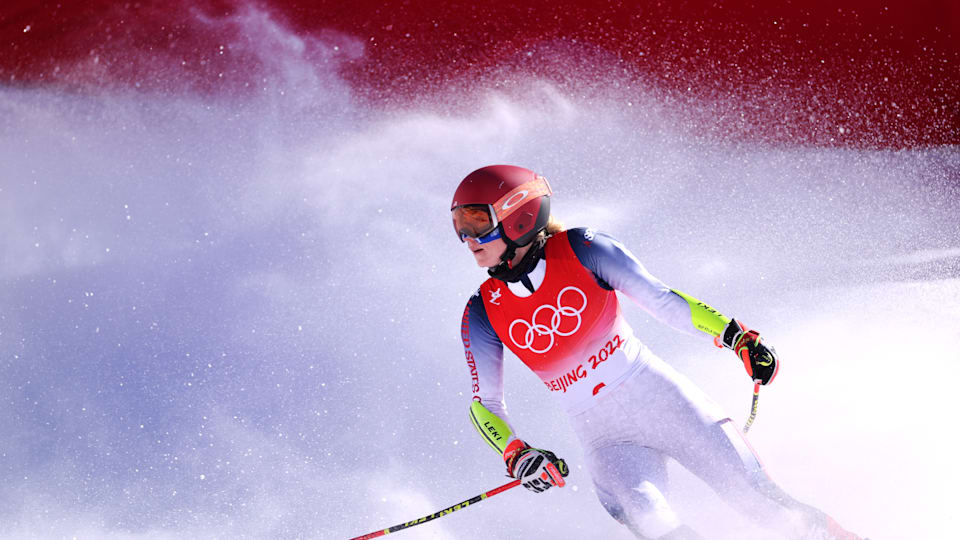Undeterred Mikaela Shiffrin says, "I have won in my career and I'm going to win again."
The American alpine skiing star looks back on her Beijing 2022 experience

The Olympic Winter Games Beijing 2022 were not what American alpine skiing star Mikaela Shiffrin expected – she’ll be the first to tell you that.
The 26-year-old went into the event as a two-time Olympic gold medallist and 73-time World Cup winner - including a record-setting 47 victories in slalom races.
But in Beijing, in three of the five races she entered she recorded DNFs. In the two races she made it to the finish line in, she recorded ninth (Super-G) and 18th-place (Downhill) finishes.
It was a rare moment when one of the sport’s most decorated didn’t do what she’s – for so long – made look so effortless.
“You can fail and not be a failure,” Shiffrin told Olympics.com in an interview.
Support from Simone Biles
Those words are reaffirmed by the likes of seven-time Olympic artistic gymnastics medallist Simone Biles, who, like Shiffrin, has pushed the boundaries of her sport.
“To get any level of even acknowledgment from Simone is insane because to me, she's so beyond, she's just an insane athlete,” said Shiffrin, referencing Biles’ support on social media throughout the Games. “And the fact that she said, ‘You're still one of the greatest athletes in the world, and this Olympics didn't change any of that.' It means a lot to hear.”
Biles entered last summer’s Tokyo 2020 Olympics Games, held in the summer of 2021, with similar expectations to Shiffrin. With the potential for as many as five gold medals, Biles experienced what gymnasts call ‘the twisties,’ where the mind and body connection starts to break down. Biles found herself unsure she could execute many of the moves she had made famous in the sport.
She withdrew from four individual finals in order to prioritise her mental health, before returning to competition on the final night to win balance beam bronze.
For Shiffrin, Biles’ actions in Tokyo and support throughout Beijing shows what the future may hold for the skier as time moves on.
“She has a little bit of distance from [Tokyo] and has had some pretty great experiences more recently now,” said Shiffrin. “And I imagine she's starting to think, ‘Hey, you know what? As awful as it felt in that moment, it just wasn't… it just wasn't that bad. It wasn't the worst thing that happened in my career,’ and many people would consider it somehow the best thing that happened in her career and how it gave so many other people around the world permission to just be a little bit more vulnerable.”
Shiffrin: "I have won in my career and I'm going to win again."
Even just days removed from the 2022 Winter Olympics, Shiffrin is seeing positives from what was at the time sheer disappointment.
“I have won in my career and I'm going to win again, and ironically, I'm going to win because of the skiing that I've been doing these last couple of weeks while we've been here,” she said. “It’s some of the best skiing I've ever done: even the first turns that I made in the races in tech is some of the best turns or the best skiing that I've started in a race with the intensity and the mentality that I have to have in order to really have a shot at podiums and winning races.”
That could start as soon as next week with Shiffrin’s season is far from over, she is heading straight to Europe as the World Cup circuit rolls on.
She’s not sugar coating her experience, and isn't afraid to admit that the disappointment still hurts.
“We're here because we're competitive, and we're working day in and day out for a goal. We want to win, and it hurts when you don't, especially when you feel like you've actually put in your best effort and it wasn't good enough,” said Shiffrin. “That stings.”
Grief was 'maybe the only thing that could prepare me'
But her perspective has changed with the sudden loss of her father, Jeff, in February 2020. Grief giving way to change.
“I think my heart knows that the priorities are the same with a twist, that was maybe the only thing that could prepare me for some of the disappointment I felt this Games,” she said. “But at the same time, when you when you re-prioritise, it also... It's like I would have never accepted the thought that I would DNF multiple times in a race before that loss [of my father], and so I never did it, it just... It was not even a possibility.
“But this time around it was like, ‘Well, I'm going for it, and the worst that can happen, I suppose, is that I don't finish,’” she continued, “and I'm willing to risk that because it's just not the worst thing that's going to happen in my life.”
A lesson learned bravely put on display for the world in Beijing.
